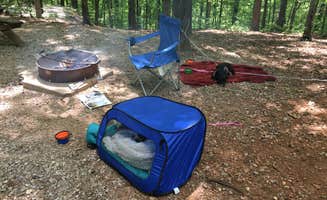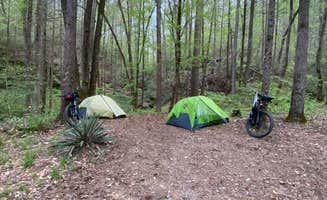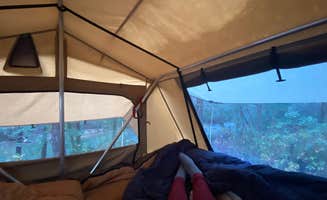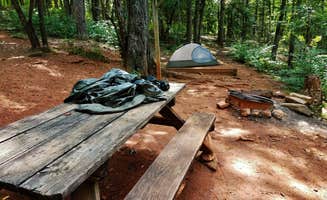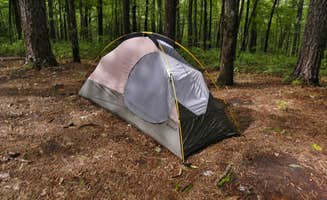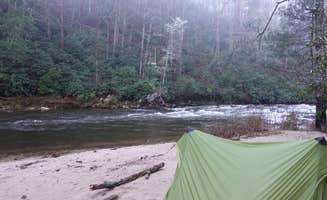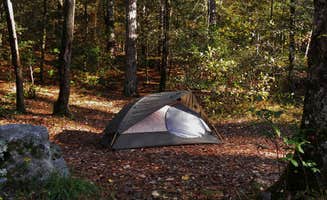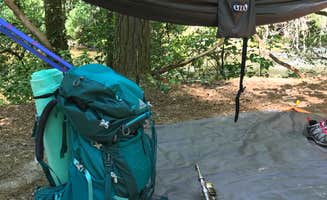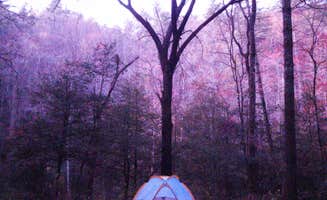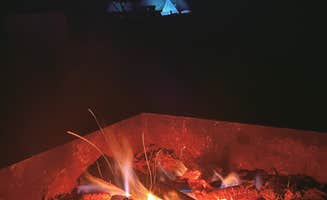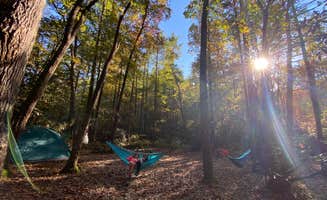Tent camping opportunities around Clemson, South Carolina extend beyond developed campgrounds into the remote corners of Sumter National Forest. Most primitive camping areas sit between 1,200-1,800 feet elevation, where temperatures typically range from 30°F in winter to 85°F in summer. The network of forest roads provides access to dispersed sites that can't be reserved ahead of time.
What to do
Fishing opportunities: The Chatooga River at Burrells Ford offers excellent trout fishing with valid licenses. "Good amount of camping with a short hike in. Sites are right on the Chatooga River. This river is stocked with trout. Fishing license is required but both SC and GA are acceptable as the river is the state line," notes Jason D.
Waterfall exploration: Multiple cascades exist within hiking distance of the camping areas. At Riley Moore Falls Campsite, you can camp near the falls. "Great spot in the banks of the Chauga River just by the falls for dispersed camping. Accessed from St Rd 37-748, a 4x4 will get you to trailhead, spots for maybe 3 vehicles," reports Robbie B.
Stargazing: The remote tent sites offer excellent night sky viewing away from light pollution. "Sky was clear and bright with stars. I risked it and chose no fly tonight just to take in the view. Perfect weather," shares Alexander C. about his experience at Riley Moore Falls.
What campers like
Privacy between sites: Many primitive tent areas offer significant separation between campers. "Great for swimming and Hammocking!" notes Elise W. about Burrells Ford, adding that there are "Great Private Campsites on the river."
River sounds: The background noise of flowing water creates a peaceful atmosphere at waterside sites. At Grapevine, one camper stated, "I love camping here. Most sites are by the creek. And they are far enough away from each other you really feel at one with nature."
Forest solitude: Several camping areas provide an escape from crowds, especially midweek. At Sumter National Forest Big Bend Campground, a visitor found "complete solitude" and reported, "Got here right before dusk and it was complete solitude. Packing up in the morning and a fisherman showed up to walk down the hill. Otherwise, saw no one."
What you should know
Road access challenges: Many tent camping areas require driving on rough forest roads. For Big Bend Campground, Myron C. warns, "It is accessible only by driving on a one and a half mile forest road that is rough with lots of rocks and pot holes. You cannot drive to this site with a low clearance sedan."
Limited facilities: Prepare for minimal or no amenities at most tent sites. "There are no defined campsites we could see. Just a giant field to set up and camp. There is no water or any hookups. You will need to pack in and pack out everything," explains Adam V. about Denver Downs Farm.
Seasonal considerations: Weather patterns impact both access and comfort. Winter temperatures can drop significantly, as Christy C. discovered at Burrells Ford: "It dropped to 17 degrees and our plan to stay in 2 tents quickly changed to everybody in the 4-man/3-season tent."
Tips for camping with families
Shorter hikes: Select sites with easier access for children. At Jones Gap State Park Campground, Laura C. recommends "spot (#8) which is the closest walk in spot from the Parking area. We were able to hike in a ton of gear (coolers, dog bed, etc.) with a little work and a few trips and it was worth it for the seclusiveness."
Riverside activities: Many sites provide water play options during warmer months. Jones Gap sites are "right on the river and a great place to catch some sun on the rocks or rock hop," according to Laura C., who successfully camped there with a toddler.
Wildlife education: The diverse ecosystem provides teaching opportunities. Stacy B. notes Jones Gap "is a great campsite for 1st time backpackers. The site is approximately 1 mile from the state park office."
Tips from RVers
Size limitations: The best tent camping near Clemson isn't suitable for larger RVs. Regarding Jocassee Gorges Wildlife Management Area, Candy H. reports simply, "Not big rig friendly. Lots of opportunities for kayaking, hiking. Not an easy place for first timers to get into."
Alternative options: RVers should consider nearby developed campgrounds instead. Denver Downs Farm has limited facilities and "Very close to I-85 and easy to get to. Feels very safe. A little highway noise, but not bad," according to Adam V.
Hybrid camping strategy: Some visitors combine tent camping with nearby RV parking. At Jocassee, Erica notes, "A lot of people hike in to these campsites via the foothills trail but it's a very long hike so we carefully boated in from the Devil's fork side."


